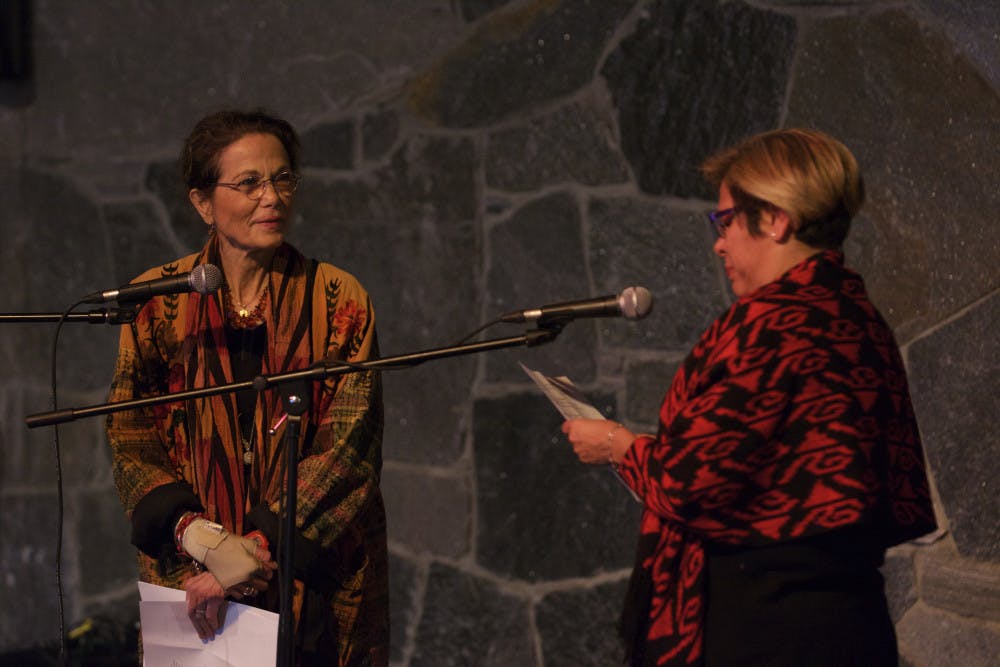Last Thursday, Jan. 21, above the faint hustle and bustle of Crossroads Café, students, faculty and staff took the stage to take part in a night of poetry and spoken word performances. Organized by MOSAIC, Middlebury’s Interfaith Programming Board, and co-sponsored by the Scott Center for Spiritual and Religious Life, the one-hour event centered on the theme of gratitude. Attendees, who floated in and out of the space throughout the evening, were asked to bring a non-perishable food items for donation to the HOPE Food Pantry.
MOSAIC was founded last year by Eli Susman ’18.5, Alex Freedman ’18 and Mariam Khan ’16.5, who met at a religious life leader retreat hosted by the Scott Center for Spiritual and Religious Life during spring break. The following summer, the three went on a trip, also sponsored by the Scott Center, to learn how to participate in interfaith dialogue and create events on college campuses that unify people from all religious and non-religious backgrounds. This past fall, MOSAIC celebrated its launch with an Atwater dinner, featuring Laurie Patton as a keynote speaker. The current board members – Henry Burnett ’18.5, Mariam Khan and Alex Freedman – are looking to gain recognition as an official student organization in the near future.
Thursday’s poetry night, dubbed “GRAT-I-TUDE,” was MOSAIC’s second public event. Burnett emphasized the importance of the theme in his opening remarks to the audience.
“Gratitude is not just to the benefit of the person feeling grateful,” he stated. “For instance, I think I tend to smile at people when I am having a good day. There might be someone that I pass who is having a very difficult day for some reason. I can’t see how they’re feeling on the inside. But when I practice gratitude in my own life and I smile at that person, maybe I remind them that not everything in the world is a dark storm. As we raise our own gratitude, we are able to propagate that through the campus in a ripple effect.”
The program included Director of Parton Counseling Ximena Mejia, Writer-in-Residence Julia Alvarez, David Dennis ’18, Hamza Kiyani ’17, Executive Director of College Mental Health Services Gary Margolis, Laurie Jordan, Izzy Cass ’19, Hasher Nisar ’16.5, Professor of American Literature Brett Millier, Associate Chaplain Rabbi Ira Schiffer, Maryam Mahboob ’18, Assistant Professor of Modern Hebrew Orian Zakai, and Bilal Khan ’18. The final act featured a poem written by President Laurie Patton, who was unable to attend but submitted a piece to be read aloud.
From “Help, Wow, Thanks: The Original Prayer” to “Flat: Sentences from the Prefaces of Fourteen Science Books,” the thirteen performances of the evening reflected a wide array of beliefs, practices and worldviews. One by one, students, faculty and staff recited such sentiments as, “I am thankful for the mess to clean up after a party because it means I have been surrounded by friends,” “There are a million invisible muscles I never took the time to thank” and “Wear gratitude like a cloak and it will sink deep into your life.”
Mejia and Alvarez collaborated in their presentation of “Gracias a la Vida,” with one reading the song aloud in English while the other recited the Spanish version. Often considered the Bob Dylan of Latin America, Chilean composer Violeta Parra originally wrote the song as a suicide note.
“Thanks to life, which has given me so much,” Mejia read at the end. “It gave me laughter and it gave me tears/With them I distinguish happiness from pain.”
Despite the serious nature of many of the presented works, the evening still gave way to a few moments of humor. Before presenting the two versions of his poem, Khan joked that he was not sure if his translation was entirely accurate, as he had hastily jotted it down on a paper fifteen minutes prior.
“I will do the translation first and then the English version. I will not mix the two, because that is sinful,” he added, making a jab at a previous student presenter’s decision to switch to the Indonesian translation after each English line.
Other highlights from GRAT-I-TUDE included a piece about an overnight bus ride from rural Nova Scotia to Boston in the 1940s and Patton’s Hebrew poem, “When You Go Forth.” Freedman read the work aloud to close the evening, beginning with the biblical verse, “When you reap your harvest in the field, you shall not go back to catch it.”
Another memorable moment came from Cass’s recitation of “Flat: Sentences from the Prefaces of Fourteen Science Books”: “However, Chapter 7 was written in a relatively self-contained fashion, so the serious student may skip Chapter 6 and delve directly into the theory,” one line read, prompting chuckles from the audience.
The purpose of the event was to play on a commonality amongst all religious traditions: gratitude. Likewise, the fall Atwater dinner was inspired by the universality of food as a socialization tool across cultures. MOSAIC is intentional in its programming, as it strives to attract not only people across all religions, but also those without faith backgrounds. The organization is actively looking for new members.
“The sound of interfaith can sound exclusive to people who come from a non-faith background,” Burnett stated. “In reality, interfaith means all faith and non-faith identities.”
Poetry Celebrates Interfaith Traditions

Comments



